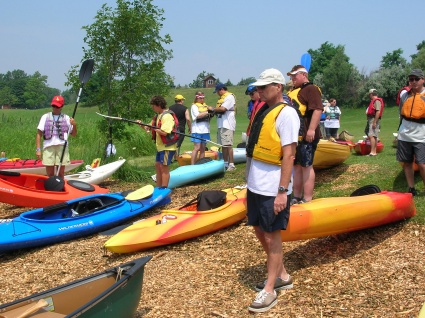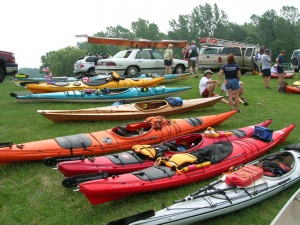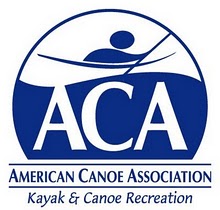Difference between revisions of "Paddlesports"
Brucejohnson (Talk | contribs) |
Brucejohnson (Talk | contribs) (→Memorandum of Agreement) |
||
| Line 40: | Line 40: | ||
===Implementation resources=== | ===Implementation resources=== | ||
* [[Administrative Resources Paddlesports]] | * [[Administrative Resources Paddlesports]] | ||
| + | |||
| + | ==Paddlesports workshops== | ||
| + | * [http://www.districtnine.org/training.php Ninth District Symposium], March 28-30, 2011, Pontiac, Michigan | ||
=Paddlesports Resources= | =Paddlesports Resources= | ||
Revision as of 13:01, 8 February 2011
| |
Paddlesports: The Next RBS Frontier for the Coast Guard Auxiliary
Paddlesports is one of the fastest growing forms of recreational boating in the United States. The Outdoor Industry Association reported in 2008 that about 17.8 million people participated in some type of paddlesports activity getting out on the water more than 50,000 times daily. With nearly one half million paddlecraft being sold annually, the US Coast Guard anticipates that by 2020 as many as 47 million paddlers will be using paddlecraft for touring, physical exercise, fishing, hunting or other activities. With an investment of just a few dollars people can gain access to the nation’s waterways and therein lies the problem. Most of these paddlers lack experience. They underestimate their skill level and fail to properly assess environmental conditions. Worse yet they often lack the proper safety equipment and the training needed to use that equipment to stay safe on the water. Consider as well, the potential for conflict as this multitude of paddlers interacts with all manner of motorboats, sailboats, and commercial vessels navigating the same nearshore waters.
The paddlesports community thus becomes fertile territory for the Auxiliary Recreational Boating Safety program. Unfortunately, the explosive growth of this segment of recreational boating has led to a disturbing upward trend in the number of injuries and accidents. Between 2005 and 2009 the Coast Guard found that canoe and kayak fatalities rose by nearly 70 percent. The sad part is that this loss of life could have been avoided with proper education. Most paddlers want to learn to how to be safe on the water, but don’t know where to go to get the necessary guidance and training.
This creates a tremendous opportunity for the Coast Guard Auxiliary. Members can engage the paddling community through our Public Education, Program Visitor and Vessel Examination programs. Auxiliary members are undaunted by new challenges like this one. Although the potential audience is quite large there is little doubt that effective safety training and counseling will lead to a marked reduction in the number of paddlesports accidents and fatalities. Initially, the workload will be significant, but remember all of those paddlers have the potential to become members of the Coast Guard Auxiliary easing the burden of this new endeavor.
Paddlesports News
Auxiliary Promotes Paddlesports Safety
The American Canoe Association (ACA) and the U.S. Coast Guard Auxiliary announced signing of a Memorandum of Agreement to promote safety among those who use kayaks, canoes and other paddlecraft. The new agreement establishes cooperative efforts broadening outreach and education to the paddle sports community. Paddlesports boating is one of the fastest growing recreational activities in the United States. In 2008 the Outdoor Industry Association reported that approximately 17.8 million people participated in paddlesports, getting out on the water nearly 50,000 times daily. Read More >>
Memorandum of Agreement
This Memorandum of Agreement (MOA) is entered into by the American Canoe Association and the U.S. Coast Guard Auxiliary for the purpose of establishing a framework for a cooperative relationship under which the U.S. Coast Guard Auxiliary (Auxiliary) and the American Canoe Association (ACA) will assist one another in areas of mutual objectives.
This Agreement is authorized under the provisions of 14 United States Code, Section 821 through 832, the Code of Federal Regulations, Title 33, Part 5 and COMDTINST M 16790.1F (Auxiliary Manual) which establish promoting and improving recreational boating safety as a priority of the Coast Guard Auxiliary and authorize entering into agreements with States, local government and private entities to enhance boating safety. The American Canoe Association, Inc. is authorized by its National Bylaws to enter into to this agreement.
The Auxiliary and ACA share similar concerns and responsibilities for educating members in a wide variety of boating and nautical subjects. This agreement will encourage the agencies to communicate and to share information and training. Specific activities to be conducted under this MOA will be defined on a case-by-case basis by the ACA and the Auxiliary. Each Party may collaborate in the conduct of a broad range of domestic projects that support recreational boating safety, including but not limited to Public Education Programs, Vessel Safety Checks, Water Safety Education Outreach, and Volunteer support.
- A representative from each Party at the headquarters level may regularly provide each other updates through written correspondence, coordination meetings, and other mechanisms on program activities, training, development and related work pertaining to cooperative activities pursued under this MOA.
- Any ACA local group may establish local, volunteer working relationships with the local Auxiliary to support training and to promote recreational boating and water safety. Any local Auxiliary group may establish local, volunteer working relationships with the local ACA group to support training and to promote recreational boating and water safety.
- Nothing in this MOA shall be construed to require the ACA to use the Auxiliary or for the ACA to be responsible for conducting Auxiliary programs. Nothing in this MOA shall be construed to require the Auxiliary to use the ACA or for the Auxiliary to be responsible for conducting ACA programs.
- Each Party will work cooperatively in the exchange of applicable data, information, and products.
- Each Party will cooperate on joint outreach and educational activities that may involve other partners of either organization.
- the activities conducted under this MOA may be documented and made available through appropriate journals, publications, and other established channels, consistent with good scientific practice. Publications documenting cooperative efforts may be prepared by either Party, or jointly, provided that each Party is given an opportunity to review and concur with manuscripts prior to publication.
- The Parties agree that sharing credit is mutually beneficial and will assure that appropriate citation and attribution is given for work performed under this MOA. Uses of a Party’s logo or seal, however, will require advance approval by that Party.
- Amendment. This MOA may be modified or amended by mutual agreement of each Party in writing.
- Other Provisions. Nothing in this Agreement is intended to conflict with current law or regulation or the directives of the Department of Homeland Security. If a term of this agreement is inconsistent with such authority, then that term shall be invalid, but the remaining terms and conditions of this agreement shall remain in full force and effect.
- Duration. This MOA may be terminated at any time by mutual written agreement of Parties or by either Party upon 90 days written notice to the other Party. Otherwise this MOA will remain in effect indefinitely.
Implementation resources
Paddlesports workshops
- Ninth District Symposium, March 28-30, 2011, Pontiac, Michigan
Paddlesports Resources
Auxiliary articles
- Paddling into History, Navigator, Winter 2004
- Engaging the Paddlesports Community, The Eastwind (Ninth Eastern), Summer 2010
Brochures
- Best Practices for Paddlers and Paddlesports Programs
- Paddler's Safety Checklist
- Wear It! Lifejackets Matter
- Cold Water Survival
- Practices, Ethics and Conduct
Auxiliary services to paddlers
- Canoeing and Kayaking (for Boy Scouts)
- Paddlesports America
- Paddlesports America PowerPoint Presentations
- Paddlecraft Vessel Safety Check (Form 7012A)
Reading list
The Reading List is a compilation of print and web resources that will be of useful to instructors, vessel examiners and others involved in paddlesports safety. This list is a living document that will evolve as time goes on.
Kayak resources
- Alderson, Doug. Sea-Kayakers Savvy Paddler. Camden: Ragged Mountain Press, 2001.
- Burch, David. Fundamentals of Kayak Navigation. Old Saybrook: Globe Pequot Press, 1993.
- Diaz, Ralph. Complete Folding Kayaker. Camden: Ragged Mountain Press, 1994
- Dillon, Pamela and Jeremy Oyen, eds. Kayaking, Champaign, IL: Human Kinetics, 2009.
- Dowd, John. Sea Kayaking, A Manual for Long Distance Touring. Vancouver: Douglas & McIntyre Ltd, 1988.
- Gronseth, George and Matt Broze. Sea-Kayaker Deep Trouble and Their Lessons. Camden: Ragged Mountain Press, 1997.
- Gullion, Laurie. Canoeing and Kayaking Instruction Manual. Birmingham: Menasha Ridge Press, 1987.
- Hutchinson, Derek. Eskimo Rolling. Camden: Ragged Mountain Press, 1992.
- Hutchinson, Derek C. Expedition Kayaking on Sea and Open Water. Old Saybrook: Globe Pequot Press, 1995.
- Johnson, Shelley. The Complete Sea Kayaker’s Handbook. Camden: Ragged Mountain Press, 2002.
- Killen, Ray. Simple Kayak Navigation. Camden: Ragged Mountain Press, 2006.
- Robison, John. Sea Kayaking Illustrated, A Visual Guide to Better Paddling. Camden: Ragged Mountain Press, 2003.
- Seidman, David. The Essential Sea Kayaker: A Complete Course for the Open Water Paddler. Camden: Ragged Mountain Press, 1992.
- Wyatt, Mike. The Basic Essentials of Sea Kayaking. Old Saybrook: Globe Pequot Press 1990.
Canoe resources
- Dillon, Pamela, ed. Canoeing. Champagne, IL: Human Kinetics, 2009.
- Foster, Nigel. Open Canoe Technique. Guilford, CT. Falcon Guide, 2004.
- Jacobson, Cliff. The Basic Essentials of Solo Canoeing, Merrilleville, IN. ICS Books, Inc. 1991.
- Mason, Bill. Path of the Paddle. Buffalo, NY. Firefly Books. 1999.
- McGuffin, Gary and Joan McGuffin. Paddle Your Own Canoe. Ontario: Boston Mills Press, 2005.
- Ray, Slim. The Canoe Handbook. Harrisburg: Stackpole Books, 1992.
- Rounds, John, ed. Basic Canoeing. Mechanicsburg: Stackpole Books, 2003.
External links
- Adirondack Mountain Club
- American Canoe Association
- Canoe and Kayak Magazine
- Folding Kayaks
- Kayaking for Beginners
- Kayak Paddling .net
- Kayak Zak’s Adaptive Paddling
- Kayarchy
- Northeast Paddlers Message Board
- Northern Forest Canoe Trail
- Paddler Magazine
- Paddling.About.com
- Paddling Instructor.com
- Paddling.net
- Paddlewise
- Sea Kayaker Magazine
- Wekanu
- Western New York Paddlers Group
Media sources
- Adventure Kayak Magazine
- Backpacker Magazine
- Canoe and Kayak Magazine
- Canoe Sailing Magazine
- Family and Camping Canoeroots Magazine
- Kayak Angler Online
- Kayak Fishing Magazine
- Kayak Fishing.com
- Kayak Magazine
- Ocean Paddler Magazine
- Paddling Life
- Paddling.net
- Rapid the Whitewater Magazine
- Sea Kayaker Magazine
- Stand Up Paddle Surfing Magazine
- USCA Canoe News
- Wavelength Magazine
Contributed by
Paul Leuchner, BC-BLC, American Canoe Association Branch Chief


